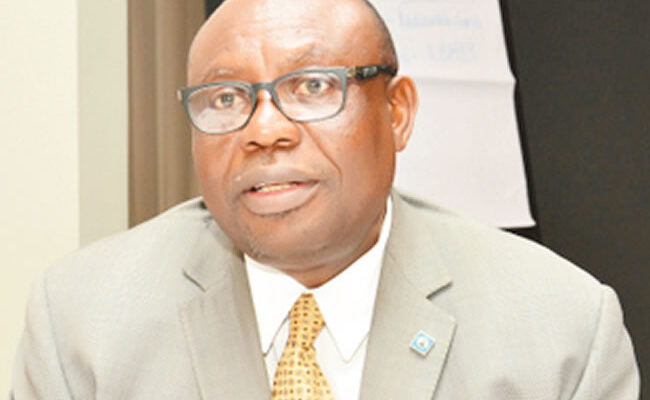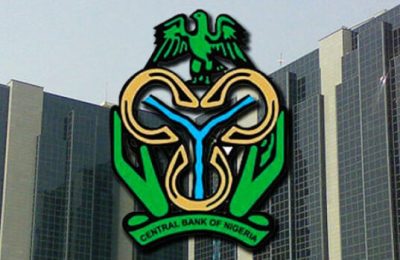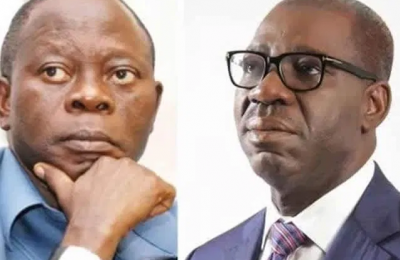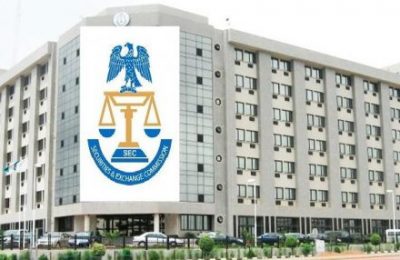National Commissioner and Chairman, Information and Voter›s Education Committee of the Independent National Electoral Commission, (INEC), Festus Okoye, speaks to SENIOR DEPUTY EDITOR, TAIWO AMODU, on the preparedness of the commission for the upcoming general election and why the commission refused to deposit the Bimodal Voters Accreditation System machine in the custody of the Central Bank of Nigeria.

The general election is just six days away. Can we say the commission is fully ready in terms of logistics for the elections?
The commission is ready for the conduct of the general election. The commission started planning for the general election after the conduct of the 2019 general election. We have delivered the full complement of the Bimodal Voter Accreditation System (BVAS) that will be used for voter verification and authentication.
The BVAS will be deployed to the 176,846 polling units across the federation. But they will not be deployed to the 240 polling units that have no registered voters. We have procured sufficient redundancies for the 8,809 registration areas and the 774 local government areas. The commission has tested the procured BVAS and certified them fit for purpose. We carried out mock accreditation and we are satisfied with the hardware and software upgrade to the BVAS. They are presently being configured in safe locations guarded by a full complement of security agencies. The result sheets and ballot papers for the presidential and National Assembly elections are in the CBN awaiting inspection. We have delivered the bulk of the non-sensitive materials required for the conduct of the election. We have finished the training of Supervisory Presiding Officers and the Presiding Officers and Assistant Presiding Officers are presently being trained.


Before the final curtain on the Continuous Voter Registration, INEC Chairman, Professor Mahmood Yakubu, gave a population of voters at 93.5 million, last year. At the end of the whole exercise and given the fact that some voters failed to turn up to pick their PVCs, can we have the total number of voters expected at polling units on February 25 and March 11?
As of today, the total number of registered voters in Nigeria stands at 93,469,008. This was recorded after the harvest of all the claims, objections and complaints. All validl- registered voters have collected their Permanent Voter Cards and the commission has requested all the Resident Electoral Commissioners to harvest the figures of collected and uncollected PVCs.
The commission will publish the total PVCs collected and deposit the uncollected ones in the Central Bank. They will be released at the conclusion of elections and resumption of the Continuous Voters Registration Exercise.
On PVCs, you have maintained that voter cards procured by desperate politicians would be useless at the polling booths. But the nefarious activity continues. Why do you think voter cards are being bought? Some have submitted that candidates are buying to disenfranchise supporters of their main rivals in their perceived stronghold? What has been the commission›s observation(s)?
The responsibility of the commission is to register voters and make the Permanent Voter Cards available to them. It is also the responsibility of the commission to organise, undertake and supervise elections.
The commission does not have control of what individuals do in their various homes. It is also the responsibility of security agencies to intervene when crimes are committed. We will continue to take measures to improve the credibility of elections. Some desperate individuals are running from pillar to post looking for ways of bypassing the BVAS. They are desperate on account of their fear of the fact that our elections are getting better. The PVC middlemen can only buy up the PVC of individuals and engage in voter suppression. They cannot bring them to the polling units. We must continue to counsel our people on the power and potency of the PVC. Their sovereign right resides in the PVC and they must deal with it in such a manner that we do not compromise our future. One thing is certain, the BVAS will only authenticate genuine voters and not impostors. Those engaged in identity theft should keep away from the polling units.
The commission just disclosed that 240 polling units have been delisted where elections won›t be held. Nigerians need to be convinced that there are no longer idle polling units. What are you doing to reassure them?
The commission did not delist any polling unit. Polling units in Nigeria remain 176,846. The chairman of the commission stated our position clearly when he met with leaders of political parties in Nigeria. He said: “Let me therefore start with the issue of polling units. You may recall that in 2021, with your support and that of other critical stakeholders, the commission successfully expanded voter access to polling units 25 years after the last delimitation exercise in 1996.
Consequently, the number of polling units increased from 119,973 to the current figure of 176,846.” He also stated that “At previous meetings, we also briefed you on our efforts to redistribute voters to the polling units to avoid the congestion that previously made voting cumbersome in many of them nationwide. This requires the redistribution of voters to new polling units in proximate locations. Where they are separated by distance, this must be done after consultation with the voters. This has been done by our state offices nationwide. However, there are 240 polling units without registered voters spread across 28 states and the Federal Capital Territory (FCT).
They range from one polling unit to 12 polling units in each state and the FCT, except Taraba and Imo states with 34 and 38 polling units respectively. No new registrants chose the polling units and no voters indicated interest to transfer to them during the last Continuous Voter Registration (CVR), mainly for security reasons. This means that no elections will be held in these polling units. In our avowed commitment to transparency, the commission is making available to Nigerians a comprehensive list of these polling units by name, code number and their locations by state, local government and registration area. With this development, the number of polling units where elections will be held nationwide on 25th February 2023 and 11th March 2023 is now 176,606.” So, the number of the polling units remains the same, but elections will not be held in the listed 240 polling units.
Incendiary remarks and violence are infractions on the Electoral Act. INEC has only threatened to deal with aberrants. Are we going to see it make scapegoats of politicians before the elections or just stick to moral lobbies?
Those that aspire to lead must develop the democratic spirit that emphasizes good electoral conduct. The use of base and incendiary language in campaigns and rallies are aberrations that must not be allowed to continue. The commission will continue to appeal to political leaders to be civil in their language. The commission will continue to work with security agencies to investigate and deal with people that make statements that can lead to breakdown of law and order.
We have seen proactive collaboration in addressing vote buying. We saw what the EFCC did during the national conventions of the two predominant political parties when it stormed the convention ground. What should we expect at polling booths on election days?
Vote merchants, middlemen and consultants should keep away from our polling units. The votes of the people solidify their sovereign right. People must be allowed to exercise their democratic franchise without any impediment. No one is allowed to use poverty and other vulnerabilities to compromise our people. Phones and other electronic devices are still banned in the voting cubicles. People are not allowed to show how they voted. Plain-clothed and uniformed security men will be at various polling units. So, it is possible for someone to move from a polling unit straight to a detention facility.
Aside from the prevailing arsons and attacks prevalent in the South-East region, which other geopolitical zones or states would you identify as hotbeds for this election?
The commission is prepared for election and not war. The security agencies have assured the commission that they can secure the electoral environment and make it conducive for election. Nigerians are ready and looking forward to this election. We will continue to interface with the security agencies for the protection of the voters, materials and election duty staff.
What is the commission doing to forestall attacks, aside from just raising its voice?
We have dispersed our risks and installed gadgets that will enable the commission to take proactive steps before attacks occur. We are in touch and collaborating with the leaders of various communities where our offices are located. We have requested for additional security and fortified our offices. Community engagement is critical and we are utilising it.
Sometimes last year, Nigerians were taken aback that the Governor of the CBN, Godwin Emefiele, was going to join the race for APC presidential ticket. Politicians, across the divides, demanded for his removal as governor of the apex bank. They even asked INEC to stop depositing its materials for elections with CBN. Emefiele is still on his seat. Has the commission heeded Nigerians calls to move custody of its election items from Emefiele›s CBN?
The commission consulted widely with the critical stakeholders on the storage and security of sensitive materials. The commission consulted political parties, civil society groups, the media and the security agencies. At the end of the consultations, the stakeholders advised on a dual or hybrid approach. It was agreed that the BVAS remains with the commission and that ballot papers and result sheets must still be deposited with the CBN. These ballot papers and result sheets are normally inspected by the stakeholders before movement. We are satisfied with our collaboration with the Central Bank. These materials are not in the headquarters of the CBN. They are in the state branches, and they are safe.
So much cheering commendation from Nigerians for the INEC leadership on its initiative to deploy modern technology to promote transparency in the electoral process. I am talking specifically about IREv and BVAS. There have equally been reservations from certain quarters kicking against it despite the Electoral Act endorsement. Can ordinary Nigerians go to sleep, believing that Professor Yakubu won›t falter or succumb to pressures from high quarters at the last minute?
Deepening and sustaining democracy requires vigilance. The conduct of elections is a shared responsibility and all hands must be on deck in this regard. The chairman of the commission and all the national commissioners are irrevocably committed to the infusion of technology in the electoral process. The use of the BVAS is a mandatory requirement of Section 47(2) of the Electoral Act. The electronic transmission of polling unit level results is a mandatory requirement of sections 50, 60 and 64 of the Electoral Act.
ALSO READ FROM NIGERIAN TRIBUNE








